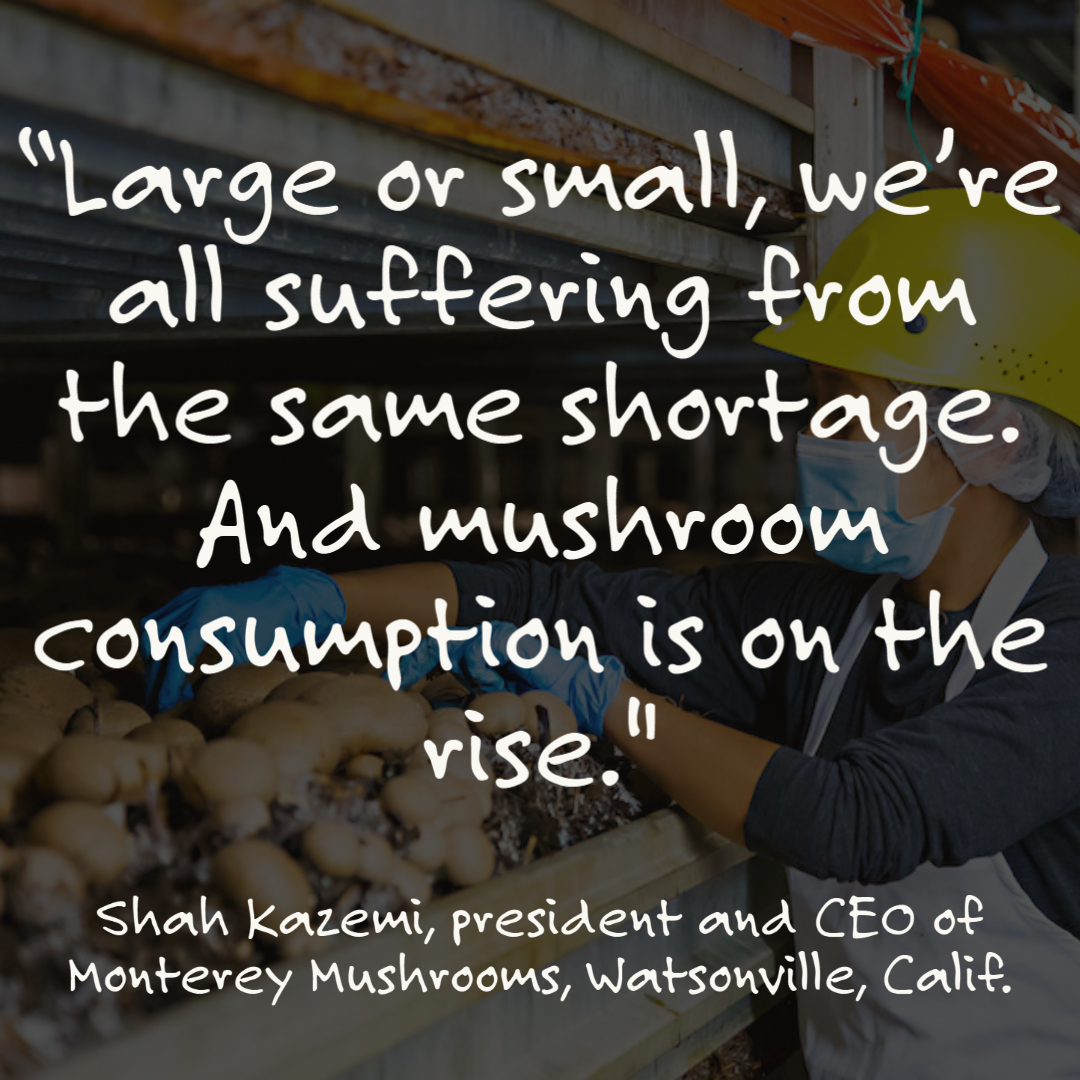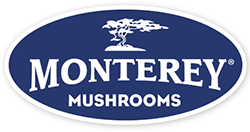Some mushrooms are missing, and it's the labor shortage's fault.
In the fresh mushroom world, the labor shortage means a supply shortage for some growers, especially because this year-round specialty crop doesn't qualify for the H-2A temporary guest worker program.
The mushroom industry is probably missing more than a million pounds a week, said Shah Kazemi, president and CEO of Monterey Mushrooms, Watsonville, Calif.
“For a company our size, that's maybe 10-20% of production not being harvested right now,” Kazemi said. “We are doing it by the skin of our teeth. We are kind of looking forward to September, when unemployment benefits come to an end when people come back to work.”
Monterey Mushrooms produces about 250 million pounds of fresh mushrooms annually at growing and packing operations in California, Texas, Illinois, Tennessee, Florida, Pennsylvania and Mexico, employing about 4,000 people in the U.S.
“Large or small, we're all suffering from the same shortage. And mushroom consumption is on the rise,” Kazemi said.

Consumer demand is steadily increasing, especially as more restaurants and foodservice businesses reopen and increase capacity, American Mushroom Institute president Rachel Roberts said in a release.
“Today's acute labor shortages means many growers are struggling to harvest all of their mushrooms, which usually produce three harvest cycles; many farms are currently not harvesting the third cycle, and the impact is lower crop yield,” Roberts said.
Also, the costs of labor, inputs and raw materials such as lumber are rising fast, so growing is even more expensive.
“It's a double whammy,” Kazemi said. “No. 1, our costs go up and other inflationary factors. Every input cost has gone up significantly, and then when your productivity goes down, then the problem gets accentuated.”
Mushrooms grow faster than any other specialty crop, sometimes doubling in size in 24 hours, so the need for timely, selective harvesting for optimal shape and size is critical.
“Throughout COVID and related issues with shutdowns, a lot of the farms had to steam off their crops because they didn't have anyone to harvest them, or some didn't have a market for them,” said Meghan Klotzbach, vice president of sales, marketing and operations at C.P. Yeatman and Sons Inc. and Mother Earth LLC, Landenburg, Pa.
Mother Earth organic mushrooms are grown in Oxford and West Grove, Pa. The region in and around Kennett Square, Pa., is considered the mushroom capital of the world, with more than 65% of the mushrooms consumed in the U.S. grown there.
“In general — at least here in Pennsylvania where it's almost two-thirds of all production — the overall sentiment on any given day is that they're down 20-25% in labor,” said Lori Harrison, director of communications at the American Mushroom Institute. “Our guys do a pretty good job of maximizing efficiencies and they're good at helping one another.”
Getting enough consistent labor has always been a problem, but now it's widespread among almost every role, both Klotzbach and Kazemi said.
“It's not just harvesters,” Klotzbach said. “It's supervisors, QA technicians, truck drivers, even office staff. It's honestly just spread among everybody. I think it's a lot to do with the climate we're living in.”
Klotzbach suggested that the Pennsylvania mushroom labor shortage is due to recent and long-term trends:
- Parents needing to stay at home while school buildings and daycares were closed during the pandemic;
- Federal economic stimulus packages and extended unemployment benefits;
- Younger generation of workers who don't want to work in this sector, preferring to work in an office or at home;
- Without the H-2A labor option, growers and packers concentrated in this region are competing fiercely for local workers, who have a big pool to choose from.
“And they hop from one to the next. They're bouncing around to see what the best opportunities are,” she said. “There is so much competition that they can choose what and where they want to be.”
Mechanical harvesting would be great, but many of the mushroom farms around Pennsylvania would need significant, costly changes in the building infrastructure to accommodate robotic equipment, Klotzbach said.
Also, the robots would need to be very intelligent because harvesters don't pick the whole mushroom bed at once. They select mushrooms for trays and tills first, the harder mushrooms that hold up well in retail stores. Next, they'll do mediums and silver dollars, for different pack sizes.
They go in sweeps and take out the mushrooms needed for each order. And in the portabella and crimini (baby bella) houses, they are even more selective.
“They really groom their sections, decide which one is best and make room for older portabellas,” Klotzbach said. “It would have to be a very smart robot and fast one.”
Mother Earth Organic Mushrooms harvests about 16 to 17 million pounds a year, and some of their harvesters pick as much as 100 pounds an hour, she said.
And they usually harvest only the first two waves or flushes, because organic mushrooms don't hold up as well for the third wave.
The U.S. customer wants consistent, evenly shaped mushrooms, which won't happen if a machine plows it all off the bed, she said.
Both Monterey Mushrooms and Mother Earth Organic Mushrooms offer competitive wages and benefits to attract labor, they said.
“But at the end of the day, we have to pass on those price increases, and there's resistance on the customer end because they're having the same problems. It's just very, very difficult,” Kazemi said.
The mushroom industry has long pushed for legislation and policies to enable a legal, reliable workforce, Roberts of the American Mushroom Institute said.
In March, the Farm Workforce Modernization Act passed the U.S. House of Representatives and is waiting introduction in the Sentate. It passed the House in 2019 as well.
“Among other provisions, the bill would establish a Certified Agricultural Worker status and open the H-2A temporary worker program to include the mushroom industry,” Roberts said in the release. “We urge the Senate to quickly take up and pass the legislation to help align labor supply with consumer demand.”
Klotzbach works on the labor committee of the American Farm Bureau, and said she's hoping for a program in addition to the H-2A program.
“We need something. This may not be perfect, but we're not getting anything else,” she said.


















